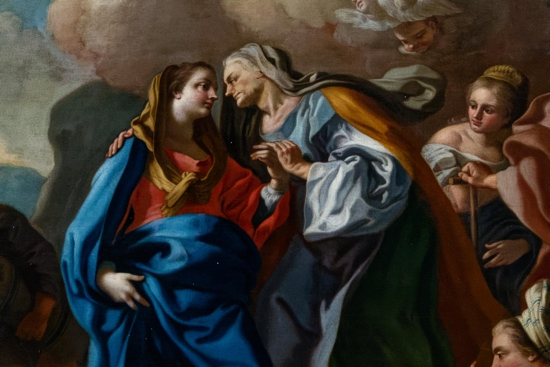
Recent columns have addressed the background to Jesus’ proclamation of the “kingdom of God.” We’ve looked at the Old Testament, the Maccabean Revolt and popular revolutionary movements in Jesus’ day. But before we get to Jesus’ words about the kingdom of God, it’s important to point out that the Gospels indicate that the kingdom Jesus proclaimed was not only a spiritual reality but also a social and political community.
We see this first in what came to be called the Magnificat (Lk 1:46-55). This is the song of praise that Mary sings when she visits Elizabeth. We are not used to thinking of Mary as the revolutionary type. But what she says suggests she is someone who is waiting for a new social order. She “proclaims the greatness of the Lord,” and this goodness is in, among other things, the fact that God has “scattered the proud in their conceit,” “cast down the mighty from their thrones,” “lifted up the lowly,” “filled the hungry with good things” and “sent the rich away empty.” This is revolutionary language. These are provocative, subversive and certainly politically charged fighting words! Mary may as well have been one of the Maccabees.
How would the current king of the Jews, Herod, have reacted if he heard Mary say this? What about Caesar, or his local governors? Mary doesn’t give us a ton of specifics here about exactly what kind of change she is expecting, or how it is to come about — we find that out later in the Gospels. But she says enough for us to locate her in that general line of kingdom expectation flowing from the Old Testament. She accordingly tells of a time when things will be turned upside down — and the key thing for her is that time is right now.
What is happening here with these two most unlikely pregnancies — Jesus and John the Baptist — is that God’s revolution is in the making. That fourth kingdom — God’s kingdom — referenced in the Book of Daniel that would replace the proud, the mighty and the rich, says Mary, was finally dawning.
This line of thought is then followed immediately by another revolutionary song of praise, the hymn Zechariah sings at the birth of John the Baptist (Lk 1:68-79). Just like Mary, for Zechariah the births of John and Jesus mean that “the God of Israel” has “come to his people and set them free,” and “has raised up for us a mighty savior, born of the house of his servant David.”
David, of course, was the king, and so this savior, too, will be king, implying a regime change in Israel. That, after all, is what the announcement of a new “king-dom” is all about. This, Zechariah says, is the great time that had been “promised … to our fathers … through the holy prophets of old.” And what, for Zechariah, is the promise? Not an inward religious experience or a spiritual kingdom but, as prophets like Daniel said, “to set us free from the hands of our enemies, free to worship him without fear … all the days of our life.” This liberation, like the great liberation that took place at the exodus, was not just an invisible or metaphorical freedom, but what we might call a historical event. It was happening on the world stage; you could point to it, and it would take a certain social form. It was, says Zechariah again, “the dawn from on high” which Israel longed to “break upon” them, “to shine on those who dwell in darkness and the shadow of death, and to guide our feet into the way of peace.”
Clearly, the Gospel writers, and Luke in particular, are setting the stage for the proper way to interpret the story of Jesus, who will come announcing that Daniel’s kingdom of God was breaking in. And while this certainly will come to mean more than the kingdoms Daniel said it would succeed — Babylon, Greece and Rome — it would not mean less. This new kingdom would be the creation — or rather re-creation — of a visible, historical people, the new Israel. A new phase of history was breaking in. None of this was lost on Mary or Zechariah.
Miller is the director of the Center for Catholic Social Thought at Assumption in St. Paul. He is the author of “We Are Only Saved Together: Living the Revolutionary Vision of Dorothy Day and the Catholic Worker Movement,” published by Ave Maria Press.




